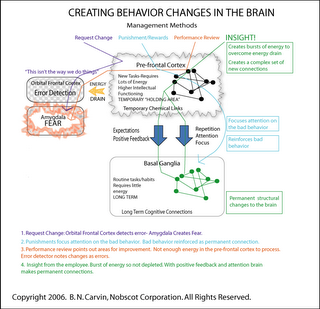465 Men and 35 Women
This from the June issue of CFO magazine by senior writer Alix Nyberg Stuart. In this well written and well researched article, Stuart probes some possible reasons for the disparity. "It seems that women choose better balance over a full-on grab for the brass-ring or have that choice very subtly made for them."
Maybe it's not so subtle though. Fifty-eight percent of women in CFO's survey said they believe that in the past 5 years they have been denied a promotion or raise at least partly because of their gender. That's a majority of women believing they were subjected to illegal discrimination.
Two reasons that the article explores around the scarcity of women in CFO positions that I found compelling:
* 98% of CEOs are men and they tend to hire someone like themselves for the CFO position. The CFO position is described as the CEOs closest confidante. This can lead the CEO to choose someone with whom he is more comfortable letting his hair down (assuming he still has any) - usually another man. (Sidenote: don't you think the CHRO should be the CEOs closest confidante? Oh wait, there is no CHRO position.)
Interestingly, the article suggests that male CEOs who have worked for a woman boss in the past or have daughters in the workforce may tend to be more open to hiring or promoting a female into a top role.
(Sidenote 2: I just read in Parade magazine that males in the House of Representatives vote on bills concerning women's safety and reproductive rights based on how many daughters they have.)
This leads me to conclude that men need to have more exposure to competent women in a professional capacity. Perhaps women oriented mentoring programs would be more beneficial if they included a component for men allowing them to both mentor and be mentored by women.
* Women need to better prepare for top level leadership jobs. The women interviewed who had made it to CFO positions had worked in a variety of positions prior to being promoted to the top spot. They had gained both deep and broad experience in a variety of business functions including operational areas. These women felt that this was critical for them to be qualified for the top spot.
It would be interesting to compare women's career paths with men's to see if in general, women tend to stay in one area rather than seek broader career experiences.
Last, no discussion on women's glass ceiling would be complete without considering whether or not the ceiling is in any way self imposed. The CFO survey shows that 68% of women take the opportunity for flexible hours into consideration when reviewing a job offer compared with 40% of the men. Opportunity to work remotely is also an important consideration in a job offer for 49% of women finance professionals versus just 28% of men. This does suggest that women may not be interested in Chief level positions in today's Fortune 500 companies. Smaller firms or self employment might be more aligned with many professional women's needs and interests. That is, until Fortune 500 companies retool themselves into being less male oriented in structure. You have to wonder if large companies are limiting their potential by being so male dominated in their upper levels of management. Women have a lot of insight that they can bring to the table. Once the table is better set for them.
Below are the survey results. I highly recommend you go to CFO magazine to read the full story and better yet sign up for a subscription as there are always articles that apply to Human Resources and the workforce.



